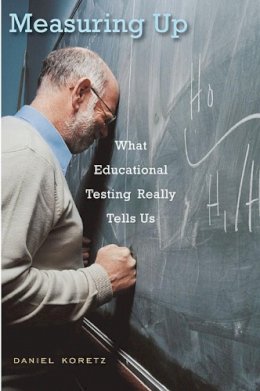
Measuring Up: What Educational Testing Really Tells Us
Daniel Koretz
How do you judge the quality of a school, a district, a teacher, a student? By the test scores, of course. Yet for all the talk, what educational tests can and can’t tell you, and how scores can be misunderstood and misused, remains a mystery to most. The complexities of testing are routinely ignored, either because they are unrecognized, or because they may be—well, complicated.
Inspired by a popular Harvard course for students without an extensive mathematics background, Measuring Up demystifies educational testing—from MCAS to SAT to WAIS, with all the alphabet soup in between. Bringing statistical terms down to earth, Daniel Koretz takes readers through the most fundamental issues that arise in educational testing and shows how they apply to some of the most controversial issues in education today, from high-stakes testing to special education. He walks readers through everyday examples to show what tests do well, what their limits are, how easily tests and scores can be oversold or misunderstood, and how they can be used sensibly to help discover how much kids have learned.
Product Details
About Daniel Koretz
Reviews for Measuring Up: What Educational Testing Really Tells Us
H.D. Hoover, Professor Emeritus, University of Iowa Here we are, lost in Testland, bombarded by data about how well or poorly we or our kids have done on the latest exam. What do test results mean? Every expert has a different explanation. What to do? Read Daniel Koretz's new book, as soon as possible. Never have I seen a clearer or more sensible exploration of our testing frenzy. I thought one chapter, "What Influences Test Scores, or How Not to Pick a School," was all by itself worth the price of the book. Read it and relax.
Jay Mathews, Washington Post education reporter and columnist Deconstructs the complexities of achievement testing for the educational layman.
Education Week
Every parent who uses league tables as a basis for placing his or her child in a school, whether in the U.S. or anywhere else, should read this book.
Lee Harvey
Times Higher Education Supplement
Test scores are objective, scientific, and easy to understand
so what's the problem? It turns out that there are a lot of problems and that we would do well to try and understand them better. Daniel Koretz's Measuring Up is an excellent place to start. The book is hard to classify. It is too sophisticated to be called a primer. There are no equations, so it can't be a measurement book. (Also, it is entertaining to read.) It says good things about testing and test use and takes apart some arguments of testing opponents, so it can't be an anti-testing book. But, it raises profound challenges to the interpretation of score trends on high-stakes tests, to the meaning of achievement trend and gap reports in terms of percent proficient, to the interpretation of crossnational achievement comparisons, and to popular assumptions about testing of students in special populations (including some assumptions written into law). So, it can't be a protesting book, either...He does a great service by clarifying measurement principles in the context of widespread testing uses and misuses.
Edward Haertel
Science
Koretz has written the book on educational testing most educators and educational policy makers have been waiting for, even if they don't know it. In a culture defined by whether one is attacking or defending the messenger, the author's endeavor is to explain what educational testing does, and does not, reveal about how students and their schools are performing...For someone looking for a good lay explanation of essential topics such as score reliability and validity, measurement error, and the relationship between high-stakes testing and score inflation, this is the book. The style is eminently readable and the topics are profoundly important.
D. E. Tanner
Choice
The best explanation of standardized testing is Daniel Koretz's Measuring Up: What Educational Testing Really Tells Us.
Diane Ravitch
New York Review of Books
